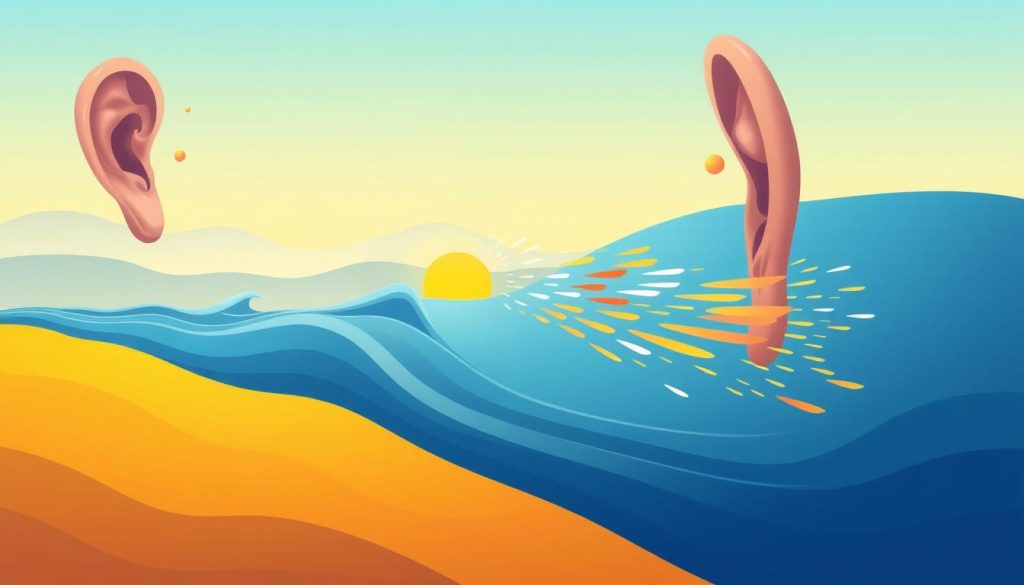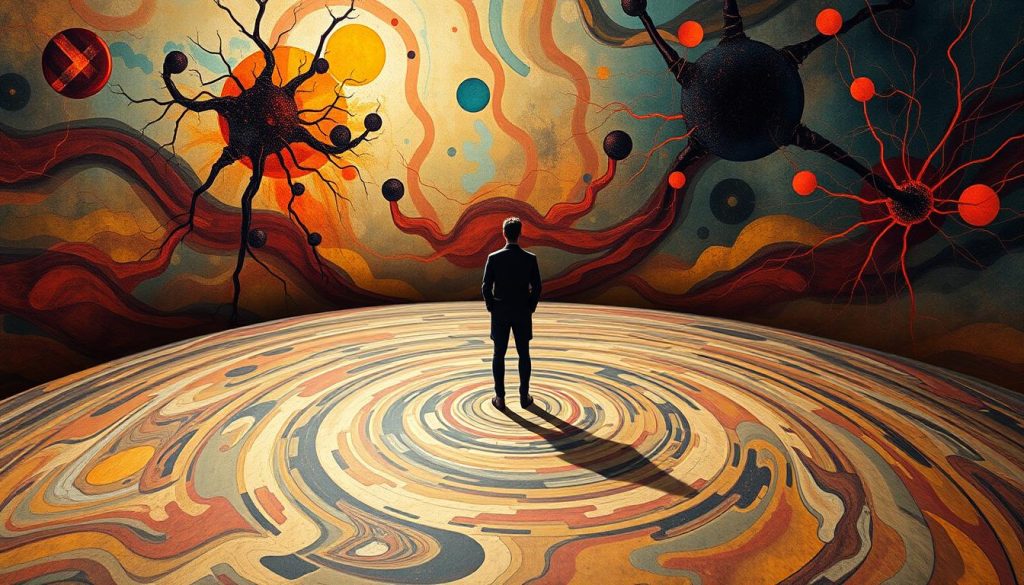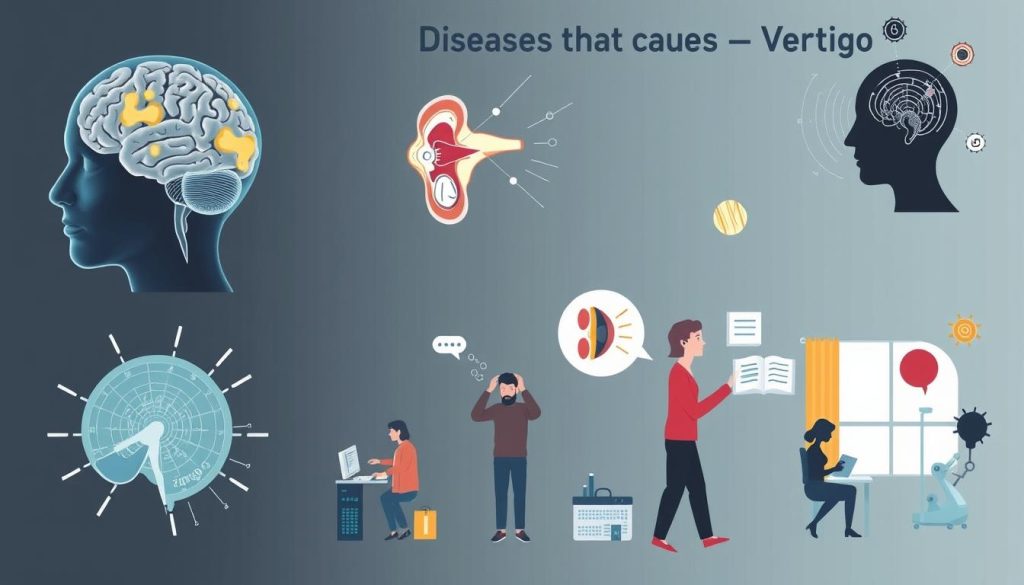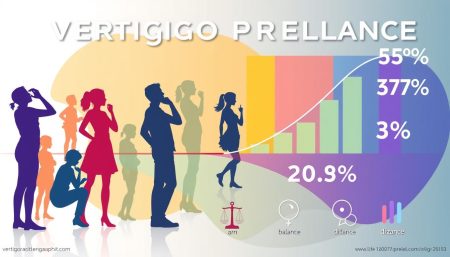Vertigo can make your world spin around. It affects millions, often due to different conditions. Knowing these disorders is key for the right diagnosis and treatment.
Vertigo can come from inner ear problems or neurological issues. Some causes lead to short episodes, while others cause lasting discomfort. Knowing the cause helps find the right care and balance back.
In this guide, we’ll look at common vertigo diseases, their symptoms, and treatments. If you or someone you know has vertigo, this info will guide you towards recovery.
What Diseases Cause Vertigo: Understanding the Core Conditions
Vertigo comes from many sources, often from the inner ear. It can be mild or severe, affecting daily life. Let’s look at the different vertigo-causing diseases and their signs.
Common vs. Rare Vertigo-Causing Diseases
Benign paroxysmal positional vertigo (BPPV) and Meniere’s disease are common causes. These inner ear problems affect many. But, rare conditions like acoustic neuroma or multiple sclerosis can also cause vertigo, though less often.
Acute vs. Chronic Vertigo Conditions
Acute vertigo hits suddenly and lasts a short time, like days or weeks. Vestibular neuritis is an example. Chronic vertigo, however, lasts months or years, often from Meniere’s disease or migraine.
Risk Factors and Predisposing Conditions
Several factors raise the risk of vertigo:
- Age: Older adults are more at risk
- Gender: Women get vertigo more than men
- Family history: Some vertigo has a genetic link
- Head injuries: Past trauma can cause balance problems
- Certain medications: Some drugs can affect the inner ear
Knowing these risk factors helps in early detection and treatment of vertigo. If dizzy spells keep happening, see a doctor for help.
Benign Paroxysmal Positional Vertigo (BPPV): The Most Common Culprit
BPPV is the top reason for vertigo, a common symptom of vestibular disorders. It happens when tiny calcium crystals in the inner ear move out of place. This causes brief but intense dizziness.
Those with BPPV might feel sudden spinning when they move their head in certain ways. These episodes usually last under a minute but can feel very confusing. Common things that can trigger these episodes include:
- Rolling over in bed
- Tilting the head back
- Bending forward
To find out if you have BPPV, doctors use tests like the Dix-Hallpike maneuver. This test shows which ear is affected and helps decide how to treat it. The best part is, BPPV is very treatable.
The Epley maneuver is a key treatment for BPPV. It tries to move the crystals back to where they belong. Many people feel better after just one or two tries. Other methods, like the Semont and Foster maneuvers, also help.
“BPPV is often a self-limiting condition, but proper diagnosis and treatment can significantly improve quality of life for those affected.”
Knowing BPPV is a main cause of vertigo helps people get the right help. While it might seem scary, most people get better with simple treatments. If you think you might have BPPV, see a doctor for the right diagnosis and care.
Meniere’s Disease and Its Impact on Balance
Meniere’s disease is a complex inner ear disorder that causes vertigo and balance problems. It affects the inner ear, leading to symptoms that can greatly impact daily life. Knowing about Meniere’s disease is key for proper vertigo diagnosis conditions and management.
Symptoms and Progression Stages
Meniere’s disease goes through several stages, each with its own symptoms:
- Early Stage: Sudden vertigo attacks
- Middle Stage: Fluctuating hearing loss
- Late Stage: Balance problems and tinnitus

Fluid Build-up in Inner Ear
The main feature of Meniere’s disease is excess fluid in the inner ear. This fluid buildup, known as endolymphatic hydrops, messes with balance and hearing. The exact cause is still unknown, but genetics and allergies might be involved.
Long-term Management Strategies
Managing Meniere’s disease needs a full plan. Patients often find help in:
| Strategy | Description | Effectiveness |
|---|---|---|
| Dietary Changes | Reducing salt intake | Moderate |
| Medications | Diuretics, anti-vertigo drugs | High |
| Vestibular Rehabilitation | Balance exercises | Very High |
| Lifestyle Modifications | Stress reduction techniques | Moderate to High |
Even though there’s no cure for Meniere’s disease, these strategies can help manage symptoms. Regular check-ups with healthcare providers are crucial for adjusting treatment plans as the condition changes.
Vestibular Neuritis and Labyrinthitis: Viral Infections
Viral infections can cause balance problems by triggering vestibular disorders vertigo. Vestibular neuritis and labyrinthitis are common causes. They affect the inner ear, leading to sudden and severe vertigo.
Vestibular neuritis inflames the vestibular nerve. Labyrinthitis affects both the vestibular nerve and cochlea. Both can cause intense dizziness, nausea, and balance problems. These issues often come from upper respiratory infections or herpes viruses.
- Sudden, severe vertigo
- Nausea and vomiting
- Difficulty walking or standing
- Hearing loss (in labyrinthitis cases)
Treatment includes rest, vestibular rehabilitation exercises, and medications. Antiviral drugs may also be used. Most people get better in a few weeks, but some may have lasting effects.
| Condition | Affected Area | Hearing Loss | Recovery Time |
|---|---|---|---|
| Vestibular Neuritis | Vestibular nerve | No | 2-6 weeks |
| Labyrinthitis | Vestibular nerve and cochlea | Yes | 3-8 weeks |
Knowing about vestibular disorders vertigo helps get quick medical help. Early treatment can greatly improve outcomes and lower the risk of complications.
Migraine-Associated Vertigo: The Neurological Connection
Migraine-associated vertigo is a complex condition. It links headaches with balance problems. This connection can cause severe vertigo symptoms, affecting daily life. Understanding the link between migraines and vertigo is key for effective treatment.
Vestibular Migraines vs. Classic Migraines
Vestibular migraines differ from classic migraines. They cause dizziness and balance issues without always triggering headaches. Classic migraines focus on head pain. Both types can lead to vertigo, but vestibular migraines make it a primary symptom.
Trigger Identification and Prevention
Identifying triggers is key to managing migraine-related vertigo. Common triggers include:
- Stress
- Lack of sleep
- Certain foods
- Hormonal changes
Keeping a diary helps track these triggers. Avoiding them can reduce vertigo episodes and improve quality of life.
Treatment Approaches for Migraine-Related Vertigo
Vertigo treatment conditions for migraine-associated vertigo involve a mix of methods:
- Medications to prevent migraines
- Vestibular rehabilitation exercises
- Lifestyle changes
- Stress management techniques
A neurologist or vestibular specialist can create a tailored treatment plan. This approach addresses both migraine symptoms and vertigo, providing comprehensive relief.
Multiple Sclerosis and Balance Disorders
Multiple sclerosis (MS) is a complex neurological condition. It can cause various vertigo medical conditions. This chronic disease affects the central nervous system, leading to balance problems and vertigo.
People with MS often face dizziness and vertigo. These conditions can make daily tasks hard. The severity and frequency of vertigo episodes vary, depending on nerve damage.

Treatment for MS-related vertigo involves several steps. Doctors may prescribe medications to manage symptoms. Physical therapy and vestibular rehabilitation exercises can also help.
Some patients find relief through lifestyle changes. Stress reduction techniques and dietary modifications can help.
| MS-Related Vertigo Symptoms | Management Strategies |
|---|---|
| Spinning sensation | Vestibular rehabilitation |
| Loss of balance | Physical therapy |
| Nausea | Anti-nausea medications |
| Visual disturbances | Vision therapy |
Understanding the link between MS and vertigo is key. Regular check-ups with neurologists and balance specialists are important. With proper care, many individuals with MS can manage their vertigo and live well.
Acoustic Neuroma: When Tumors Cause Vertigo
Acoustic neuroma is a rare tumor that can cause vertigo and balance problems. It grows on the vestibulocochlear nerve, which links the inner ear to the brain. Knowing its symptoms and treatment is key for diagnosing vertigo conditions.
Early Warning Signs
Spotting acoustic neuroma early is crucial. Look out for these signs:
- Gradual hearing loss in one ear
- Ringing in the affected ear (tinnitus)
- Unsteadiness or loss of balance
- Facial numbness or weakness
Diagnostic Procedures
Diagnosing acoustic neuroma requires several tests. Doctors might suggest:
- Hearing tests to check ear function
- MRI scans to see the tumor
- Balance tests to check the vestibular system
These tests help find vertigo issues linked to acoustic neuroma. They guide treatment choices.
Treatment Options
Treatment for acoustic neuroma varies based on tumor size and growth. Options include:
- Watching small, slow-growing tumors with regular checks
- Stereotactic radiosurgery to slow tumor growth
- Surgery for larger tumors or severe symptoms
Each method aims to manage symptoms and prevent more problems. Patients should talk to their doctor to find the best treatment for them.
Stroke-Related Vertigo: Recognizing the Emergency Signs
Vertigo symptoms can sometimes signal a serious medical emergency like a stroke. It’s important to know the difference between common vertigo and stroke-related vertigo. While many vertigo cases come from inner ear problems, stroke-induced vertigo needs quick medical help.
Stroke-related vertigo often comes with other symptoms. These include sudden numbness, confusion, severe headache, or trouble speaking. If you have vertigo and any of these symptoms, get emergency care right away.
Unlike usual vertigo, stroke-related vertigo doesn’t get better with movement or position changes. It can be very severe and persistent. Recognizing these signs is crucial, as quick treatment is key for stroke recovery.
“Time is brain” in stroke care. Every minute counts when it comes to preserving brain function and minimizing long-term damage.
To tell common vertigo from stroke-related vertigo, look at this comparison:
| Common Vertigo | Stroke-Related Vertigo |
|---|---|
| Gradual onset | Sudden onset |
| May improve with position changes | Persistent regardless of position |
| Usually no additional neurological symptoms | Often accompanied by other neurological signs |
| Can be triggered by specific movements | Occurs unexpectedly without clear triggers |
While vertigo is common in many diseases, sudden onset with other neurological signs is a warning sign. It means you should see a doctor right away to check for a stroke.
Central Nervous System Disorders Affecting Balance
The central nervous system is key to keeping us balanced. When it gets sick, vertigo can happen. These problems can affect different parts of the brain, leading to various symptoms.
Brain Stem Conditions
Brain stem disorders can mess up our balance. Issues like strokes or tumors here can cause severe vertigo. People might feel sudden dizziness, nausea, and struggle to walk.
Getting a diagnosis early is crucial. It helps in treating these vestibular disorders effectively.
Cerebellar Disorders
The cerebellum helps us stay balanced and coordinated. Damage here can lead to ongoing vertigo. Ataxia, a common issue, makes everyday tasks hard, like standing or walking.
Treatment aims to manage symptoms and improve life quality. It’s about making the best of a tough situation.
Neurological Complications
Vertigo can also come from other neurological problems. Issues like multiple sclerosis, Parkinson’s disease, and some epilepsy types can cause balance issues. These conditions need a mix of meds and therapy to manage.
Regular visits to a neurologist are vital. They help keep an eye on treatment and make needed changes.
FAQ
Q: What are the most common diseases that cause vertigo?
A: Vertigo can be caused by several diseases. Benign Paroxysmal Positional Vertigo (BPPV) is the most common. Other causes include Meniere’s Disease, vestibular neuritis, labyrinthitis, and migraine-associated vertigo.
Q: How is Benign Paroxysmal Positional Vertigo (BPPV) treated?
A: BPPV is treated with the Epley maneuver. This moves the calcium crystals in the inner ear. Sometimes, exercises are suggested to improve balance and reduce symptoms.
Q: What are the symptoms of Meniere’s Disease?
A: Meniere’s Disease causes vertigo, hearing loss, tinnitus, and ear fullness. Symptoms vary in intensity and frequency.
Q: How can I distinguish between vestibular neuritis and labyrinthitis?
A: Vestibular neuritis affects only the vestibular nerve, causing vertigo and balance issues. Labyrinthitis affects both the vestibular nerve and the cochlea, leading to vertigo, balance problems, and hearing loss.
Q: What triggers migraine-associated vertigo?
A: Triggers for migraine-associated vertigo include stress, certain foods, sleep changes, hormonal shifts, and environmental factors. Avoiding personal triggers is key to managing symptoms.
Q: Can Multiple Sclerosis (MS) cause vertigo?
A: Yes, MS can cause vertigo. Lesions in the brainstem or cerebellum affect the vestibular system. Symptoms may occur during relapses or as ongoing issues.
Q: What are the early warning signs of acoustic neuroma?
A: Early signs of acoustic neuroma include hearing loss, tinnitus, balance problems, and vertigo. Facial numbness or weakness may also occur as the tumor grows.
Q: How can I differentiate between stroke-related vertigo and other causes?
A: Stroke-related vertigo comes on suddenly with other neurological symptoms. These include severe headache, facial drooping, arm weakness, speech issues, or vision problems. Unlike other causes, it often includes nausea and vomiting.
Q: What central nervous system disorders can cause vertigo?
A: Disorders like brain stem conditions, cerebellar disorders, and neurological complications can cause vertigo. Examples include multiple sclerosis, vestibular schwannoma, and certain strokes.
Q: Are there any preventive measures for vertigo-causing conditions?
A: Preventive measures include good health, managing stress, staying hydrated, and avoiding migraine triggers. Regular check-ups and treating ear infections can also help.


















